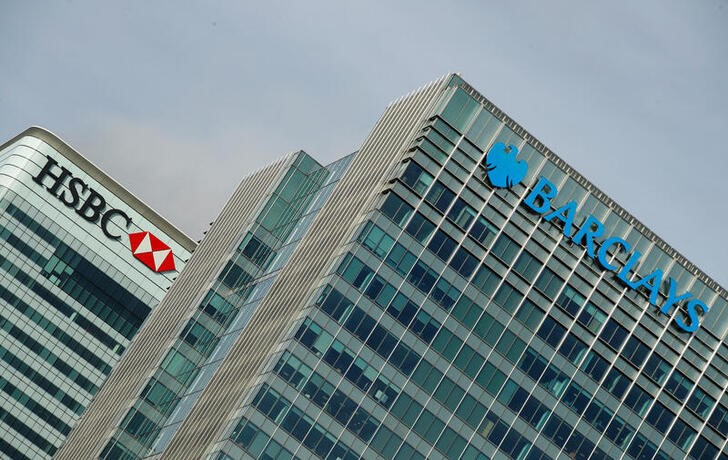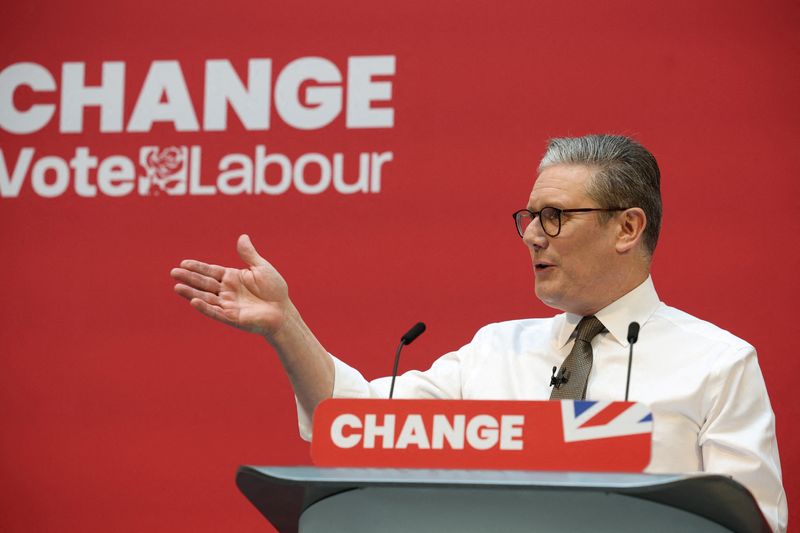By Sinead Cruise and Lawrence White
LONDON (Reuters) - Once seen as hostile to banks, Britain's Labour has courted lenders in recent years as it attempts to gain power, yet some of the left-leaning party's policies are still expected to hit the sector's profits if it wins next month's election.
Leader Keir Starmer has won plaudits among business-owners and financiers with promises of stability and a more balanced approach towards taxation of the financial and professional services sector, which contributed more than 110 billion pounds ($139 billion), or 12.3%, of total UK tax receipts in 2023.
But the party is still expected to lean on the industry to improve the financial resilience of households and consumers, many of whom have suffered disproportionately from more than two years of mortgage market volatility and a cost of living crisis.
Many lenders in Britain, including HSBC, Barclays, Lloyds (LON:LLOY) Bank and NatWest, have reported record profits in the past two years. These have been bolstered by robust lending margins, low volumes of loan defaults and modest rates paid to savers on their deposits.
Among the policies it has showcased in the run-up to the election on July 4, the Labour Party has said it will review the benefits of longer-term fixed rate mortgages to shield homeowners from steep changes in interest rates and make home ownership more accessible.
That pledge is leading some analysts, lenders and brokers to suggest a Labour government could seek additional changes across mortgages and other financial products and services to tip the balance back in favour of consumers.
"Traditional mortgage products place all the interest rate risk with borrowers," said Arjan Verbeek, the chief executive of challenger bank Perenna.
Compared to the United States, Germany, Denmark and the Netherlands, banks in Britain tend to offer a narrower range of long-term fixed rate mortgage products, which some lenders have attributed to low demand from borrowers wary of "missing out" on lower repayment costs when base rates fall.
Longer term mortgages on fixed rates would give first time buyers greater security, but would come at a cost to providers, said Daniel Austin, CEO and co-founder of ASK Partners, a specialist lender to the property sector.
"A 10-year fixed rate (mortgage) is always a lot more expensive, so the idea will not work if the cost of a 25-year fixed rate becomes prohibitive," he said.Whereas in the U.S., banks can reduce their risks and costs by repackaging and selling longer-term mortgages, lenders in Britain offset such risks more often by taking out a form of protection known as interest rate swaps with a matching duration to the home loans, mortgage bankers said.
That carries additional costs and the prices of such swaps have spiralled in the last two years amid political turmoil and rising inflation.
Just 3% of UK residential mortgage deals available as of June 19 had a fixed initial term of 10 years or more, Moneyfacts data showed.
A Labour Party spokesperson did not respond to a request for comment.
INTEREST
While an incoming Labour government may lean on banks to widen their mortgage range, analysts and senior executives at big British banks agree it is now unlikely to pursue bank windfall taxes, a policy championed by the party's previous leader Jeremy Corbyn.
Nor is it expected to overhaul how the Bank of England pays interest to banks on their deposits, another policy mooted in recent months by politicians, the sources said.
Data published by the British parliament's cross-party Treasury Committee in May showed NatWest, Barclays, Lloyds and Santander (BME:SAN) UK received more than 9 billion pounds in interest in 2023 – a 135% increase year-on-year.
"After years of low rates and sub cost-of-equity returns, banks are currently making normalised, rather than supernormal, profits," RBC Capital Markets analyst Benjamin Toms said.
"Labour looks to be taking a pro-growth stance which will be helpful for UK banks."
PROFIT PINCH
Other Labour Party policies are likely to dent bank earnings potential over time, bank analysts and industry sources said.
The party said this week it would "bring face-to-face banking back to the high street" with the opening of up to 350 'banking hubs' over the next five years - an initiative in conflict with most lenders' cost-cutting plans.
These hubs, funded by the banks, will support communities reduced to "ghost towns" by branch closures, said shadow finance minister Rachel Reeves, with some 6,000 outlets shut since 2015.
The party's Freedom to Buy scheme, its headline policy to help more Britons onto the housing ladder, is also unlikely to herald a new profit boon for banks.
"It's expected to help 80,000 first time buyers over five years, which is not game-changing for banks in the context of mortgage volumes greater than one million per annum," Toms said.
Chris Irwin, Director of Savings at Yorkshire Building Society and Moneyfacts expert Rachel Springall said the industry and whichever party is in government needed to show customers how they could boost their finances by switching savings or mortgage products.
The Financial Conduct Authority obliges finance firms to put their customers' needs first but more than 366 billion pounds of savings are stuck in low-interest accounts, costing savers more than 1,000 pounds in potential annual income, YBS data showed.

"The main reason bank profits will fall is that rates will come down. But I also think bank profits will come under pressure in the credit card and current account markets once the fair value spotlight swings over to those sectors," James Daley, managing director of Fairer Finance said.
($1 = 0.7900 pounds)
